With nothing to lose (aside from potential funny looks from neighboring test-takers), KC decided to take the advice to heart, and every time he confidently filled in a bubble on his answer sheet, he paused briefly to celebrate that moment.
The experience left a lasting impression. Whether or not it helped him do better on his test, he’s not sure, but it gave him the drive to do his best as he completed it. This “mini celebration” is something he’s continued throughout his life, as a way to celebrate the small wins along his journey.
So why exactly do KC’s fist pumps make him feel so good? “Presumably, it’s causing a release of dopamine,” says Dr. Andrew Huberman, Madefor’s Lead Advisor and a renowned neuroscientist. “Dopamine, as we normally think of it, is released in response to things that we want to achieve and achieve them,” Dr. Huberman says. He adds that these so-called “reward” or “pleasure molecules'' are actually released anytime we subjectively think we’re heading in the right direction.
So it goes to reason that when KC thought he was one step closer to acing his SATs, he was rewarded with increased pleasure from dopamine.
“The more dopamine, the more willing we are to continue down a path,” Dr. Huberman explains. “Low dopamine equals low motivation and unwillingness to pursue goals. High dopamine, or moderate dopamine is the willingness to pursue goals in high motivation.”
So did KC’s celebrations motivate him to push through the challenges of his test? Maybe. But before you take up this practice for yourself, you should know, it’s not that simple. “That internal fist bump, it’s the same thing as when dopamine is released in response to humor, which is very subjective,” says Dr. Huberman. “What’s funny to you might not be funny to me, and vice versa,” he says.
Dr. Huberman says dopamine is a currency of motivation, and we have some control over it. But not infinite control. We know dopamine is released when we are thirsty and get water, or hungry and get food, etc., but beyond the biological needs, it gets a little tricky.
We can’t give you the “Top 3 ways to increase your Dopamine levels,” at least not honestly. “That’s where the subjectivity really counts; fake it ’til you make it is false,” Dr. Huberman says. “You can’t lie to yourself and expect it to release dopamine.”
“You can’t say you love an experience when you actually hate it,” Dr. Huberman says. “It actually has the opposite effect because of something called ‘reward prediction error,’ where we expect dopamine and don’t get it.” When that happens, he says that instead of increasing your motivation, you’re really decreasing the probability that you’ll do something. “So the subjective attachment has to be real.” The good news is, however, that subjective attachment can be very broad.
And while he may not recommend everyone walk around giving themselves fist pumps, he notes there is value in not only recognizing small wins, but reinforcing the positive behaviors as you work to build new habits.
The Madefor Program uses a series of steps involving Attention/Reward/ Reinforcement/REGISTERING WINS in order to celebrate authentic wins—which can lead to a big shift, to true neuroplasticity. Just like KC did throughout his test, you are supposed to attach these rewards to the effort process, not to the result.
“The habits are grounded in this deviation from reflexive behaviors and the reinforcement by the subjective - that’s an absolute concrete thing,” Huberman says. “The brain says, ‘Wait, I wanted to do A, and instead I did B; something’s happening here.’ But the subjective attachment of, ‘Well this is good for me, I’m getting stronger, I’m getting better.’”
He says dopamine can act as a bit of an amplifier on the plasticity process through cellular mechanisms and changes in the wiring between neurons. “That’s what’s so remarkable about it. That can actually increase the rate at which plasticity occurs.”
So while what triggers your brain into releasing dopamine might be subjective, it is objectively true that there is tremendous value in celebrating the small steps of progress along our journey, given one caveat, “Provided that the celebration is authentic.”
Dr. Huberman’s work with Madefor is in the context of an advisory role; it is separate from his teaching and research roles at Stanford.
💡 Bonus: check out our Basecamp Podcast featuring Dr. Andrew Huberman on How to Create Lasting Change.



